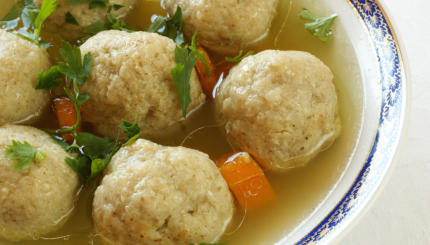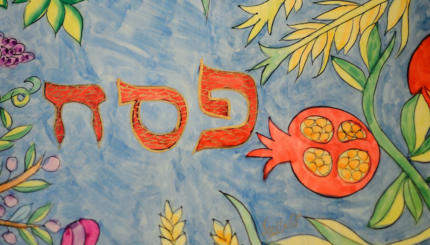Passover ( ) is one of the most significant Jewish holidays, commemorating the Exodus of the Israelites from slavery in Egypt. Its name comes from the miracle in which God “passed over” the houses of the Israelites, sparing them from death during the tenth plague on Egypt.
Passover takes place in early spring, beginning on the 15th of the Hebrew month of Nisan and lasting for seven days in Israel and eight days in the Diaspora. During Passover, Jews abstain from all leavened products (hametz) and eat unleavened bread (matzah). The primary ritual of Passover is the , a 14-step ritual meal that commemorates the Exodus from Egypt and forecasts future redemption as well.
In anticipation of Passover, Jews traditionally clean their homes of all leaven — defined as fermented food prepared from five species of grain: wheat, barley, oats, spelt and rye. These grains may only be consumed in the form of matzah, a specially-prepared flatbread which has no added yeast and which has been cooked, start to finish, in under 18 minutes to prevent natural fermentation. Cleaning the home involves not only ridding cupboards of leavened foods, but also cleaning surfaces to remove any potential fallen crumbs. After the home has been cleaned, dishes, pots and cooking appliances are kashered — made specially kosher for Passover. Any leavened foods that are not consumed or disposed of before the holiday are sold to non-Jews for the duration of the holiday.
The primary ritual of Passover is the seder, an elaborate evening meal that involves eating an array of symbolic foods, including matzah, bitter herbs (maror), parsley (karpas) dipped in saltwater and a sweet paste called haroset. The seder’s rituals and liturgy are laid out in the Haggadah, a book that serves as a guide to the proceedings. Iconic seder rituals include drinking four cups of wine, having the youngest child present recite the Four Questions, breaking the middle matzah to make the afikomen and opening the door at the end of the evening to welcome the prophet Elijah. The purpose of the seder is to relive the experience of the Exodus from Egypt, to pass down the communal memory of the foundational Jewish story, and to reflect on the theme of divine redemption. All Jewish communities hold a seder on the first night of Passover after sundown. Outside of Israel, most Jews hold a second seder the next night as well.

Help us keep Jewish knowledge accessible to millions of people around the world.
Your donation to My Jewish Learning fuels endless journeys of Jewish discovery. With your help, My Jewish Learning can continue to provide nonstop opportunities for learning, connection and growth.
Although the primary focus of Passover is the seder and the distinctive diet observed all week, there are also special synagogue services for the holiday. Jews attend synagogue in the morning on the first and last days of the Passover. Those services include special biblical readings, including Song of Songs and Hallel, a collection of psalms of praise and thanksgiving (which is also recited at the seder). During the last days of Passover, Yizkor, a service in remembrance of the dead, is recited at synagogue — one of four times per year this happens.
The origins of Passover lie in pre-Israelite spring celebrations of the first grain harvest and the births of the first lambs of the season. In a Jewish context, this agricultural rite became merged with the celebration of God’s great redemptive act at the time of the Exodus. Passover is one of three pilgrimage festivals in Jewish tradition, all of which weave together agricultural and historical themes. The other two are Shavuot (barley harvest/giving of the Torah on Mount Sinai) and Sukkot (fall harvest/wandering through the wilderness after the Exodus). In ancient Israel, Jews traveled to Jerusalem three times per year for each of these pilgrimage festivals. Since the destruction of the Temple in 70 CE, the focus of Passover shifted to the seder which normally takes place at home.Passover marks the beginning of a period of the Jewish calendar called the Omer. This is a seven-week period that lasts until Shavuot, the next major Jewish festival, and it is considered a period of semi-mourning. For this reason, Jewish weddings are traditionally not held during these seven weeks.
Prep for Passover like a pro with this special email series. Click here to sign up and you’ll receive a series of helpful, informative, and beautiful emails that will help you get the most out of the holiday.
Haggadah
Pronounced: huh-GAH-duh or hah-gah-DAH, Origin: Hebrew, literally “telling” or “recounting.” A Haggadah is a book that is used to tell the story of the Exodus at the Passover seder. There are many versions available ranging from very traditional to nontraditional, and you can also make your own.

Help us keep Jewish knowledge accessible to millions of people around the world.
Your donation to My Jewish Learning fuels endless journeys of Jewish discovery. With your help, My Jewish Learning can continue to provide nonstop opportunities for learning, connection and growth.



